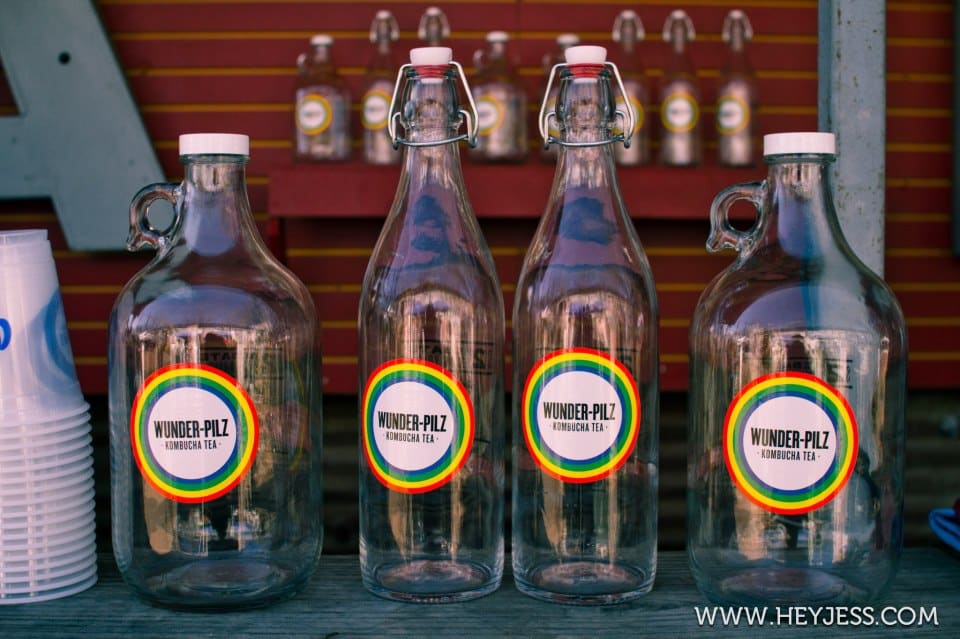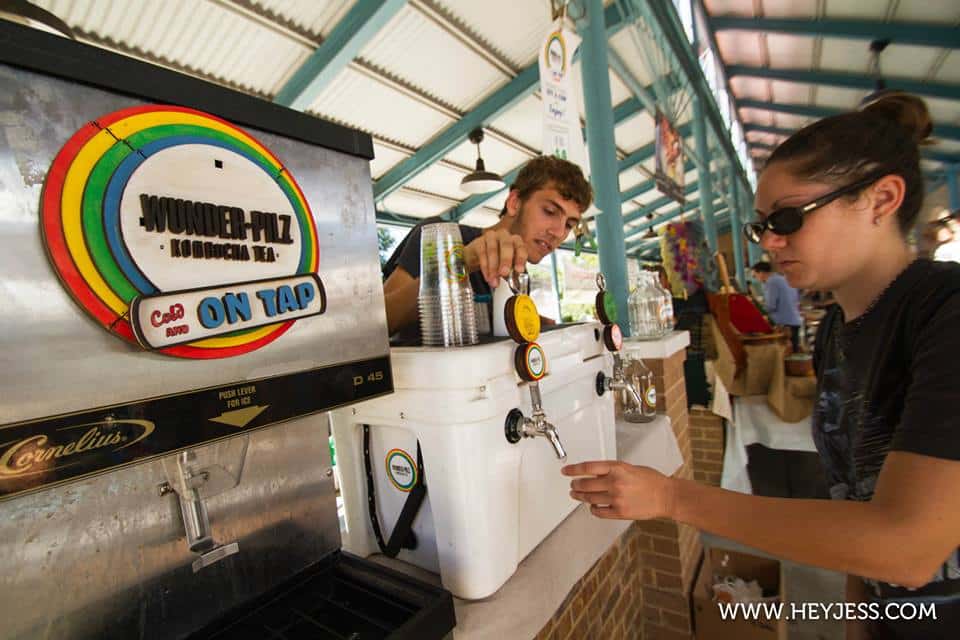
From a keg you can put in in a growler–who needs beer? (Credit: HeyJess.com)
Kombuch-huh?: interjection – a sense of bewilderment when first learning about the fermented beverage called kombucha.
You’ve most likely stumbled across aisles of brightly labeled bottles and non-alcoholic taps during a recent visit to the grocery store. And not just in the crunchy-granola-ish of health food stores, either. Kombucha is at your local grocer and even on the menu of your favorite restaurant. It’s everywhere. But have you tried it yet?
Maybe, you’re like me. I happened upon these fizzy magical drinks by chance and now I need my weekly fix. But as an ever-curious foodie, I always want to know more about the miraculous foods I’m putting into my body.
If you’ve steered clear of kombucha because a friend’s aunt told you it tastes like vinegar, I hope this article will convince you to give it a chance.
So What Is Kombucha Really?

Tapping into Wunder-Pilz Kombucha at Hope Farmers Market (Credit: HeyJess.com)
Bill Nadalini, founder of Wunder-Pilz Kombucha, has learned to recognize the face of a kombucha novice from a mile away. When they approach his farmers’ market booth with its signature rainbow- and animal-bedecked taps, he watches as they tick off a running mental list of possibilities. Taps usually mean alcohol, soda, juice or tea. But that’s not what Wunder-Pilz is serving up. For most, the wunderous booth remains a mystery, so Nadalini captivates his audience with a carefully crafted explanation of his fermented phenomenon.
It will be sour, he tells them, “like a sour candy, or sour wine or beer.”
If faces still appear skeptical, he offers the health benefits of kombucha. Nadalini believes, “When you look after your gut, you look after your mind.” And kombucha is chock-full of probiotic and liver detoxifying agents that promote this gut-mind connection.
Last, but not least, come simple instructions on how to consume the drink at hand: slowly. Like a fine wine, fresh pressed juice or hoppy beer, kombucha should be savored.
Nadalini prides himself on the particular quality and flavor of his brews, which are made from 100% organic ingredients, always served on tap, and only served in and around Austin.
Each of the four Wunder-Pilz flavors are brewed with teas and herbs, and fermented to honor the true flavor of the kombucha without added sweetness. The effect is a tart effervescent drink that can have a vinegary or alcoholic sensation, but also has an intriguing, incredible taste that combines tea with hints of fruits or herbs.
Brewing Kombucha: The Story of SCOBY
At its core, kombucha is a tea that uses a a special culture of bacteria and yeast called a SCOBY that eats up the sugar–creating the fermentation process. If you’re curious, SCOBY stands for Symbiotic Culture of Bacteria and Yeast. Nadalini first learned about fermentation by brewing his own beers and wines, becoming fascinated by the process of using microorganisms to “turn something sweet and undrinkable into something you would want to consume.” Kombucha intrigued him even more, as it’s a fermented product with health benefits that is categorized as non-alcoholic by law. He strives for a fine balance of “dryness, flavor and effect” when he brews.
You could compare Wunder-Pilz to dry, hoppy beer. It’s something that intrigues the pallet and leaves you wanting more. But what makes kombucha different from alcoholic drinks are its health benefits, mainly derived from the acetic acid and probiotic content.
When Nadalini is not advocating for keeping unneeded sweetness out of his product, the fermentation expert waxes poetic about herbal medicine: “There are plants that can give you energy or calm your nerves; there’s a magical quality to that.” This magic has played a role in the development of the Wunder-Pilz four signature flavors: Energy, Calm, Strength and Heart. Each flavor presents an interesting combination of tea and herbs that offer reactions true to their name. For example, Heart combines hibiscus, rose hips and yaupon holly, which lower blood pressure and trigger the same mood-regulating chemical reaction in the body that chocolate does. In essence, the Heart flavor is a heart opener.
Family of Brewers
The number of kombucha brewers in Austin is vast. Each offers its own spin on this fermented favorite. And just like we all have a favorite craft beer, everyone will have personal preferences when it comes to kombucha. Some like it dry or sweet, or with chia seeds, in a glass, from a tap, inspired by cola, or dreamed up by a local restaurant.
Nadalini admits the intensity of Wunder-Pilz is not for everyone. He considers every kombucha brewer part of a “family or brotherhood” in which everyone is supported in making kombucha more accessible and approachable. Just like beer or wine, a sour brew can take some getting used to, so you work your way up. Nadalini suggests that if you usually like your drinks sweet (you favor a fruity cocktail over that IPA), then start with a sweeter brand of kombucha. However much you drink is up to you. Nadalini drinks about a pint a day, but he recommends you listen to your own body.
Try Kombucha for Yourself
To find Wunder-Pilz on tap, visit their website (scroll down to the footer). If you want to try a different spin on kombucha, check out the company’s Wunder-Pops, a tasty collaboration between Kaylee Walters, pastry chef at Thai Fresh, and Wunder-Pilz. The popsicles will make their official debut at ACL Fest 2015. Detox in a cool way!
Whatever you do, get out there, Austin. Head to the store, farmers’ market or bar and try your first sip. You may even find that kombucha can replace beer as your favorite fermented craft beverage–gasp!
Bonus: Other Austin Kombucha Breweries to Explore
Kosmic Kombucha
Buddha’s Brew
LIVE Soda
@theAustinot wants to know:
Have you tried kombucha yet? What’s your favorite flavor or brand?
- Date Ideas Austin – 20 romantic things to do during day and night! - February 4, 2023
- Whole30 Friendly Restaurants in Austin That Encourage the Journey - February 6, 2017
- Guide to Austin’s Zilker Park for Every Season of the Year - January 19, 2017

Leave a Reply
You must be logged in to post a comment.